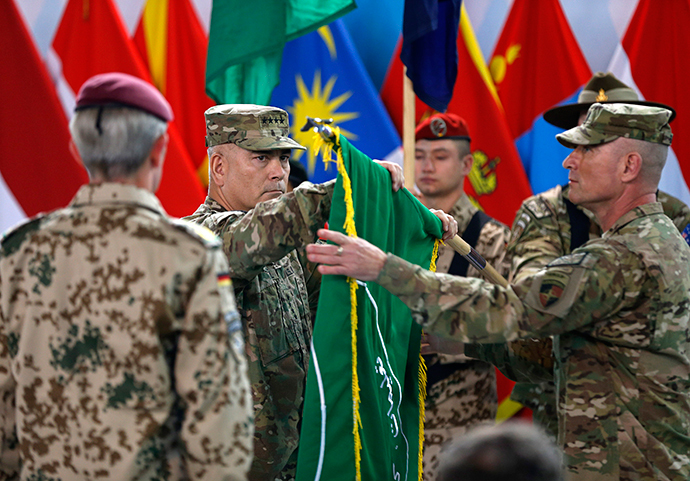‘More stable & prosperous than ever’? NATO officially ends 13-yr mission to Afghanistan
After over 13 years, the US and NATO have formally ended their war in Afghanistan. As the Taliban expands its power in the region, fears are growing over whether Afghan forces will be able to maintain security.
"Resolute Support [mission] will serve as the bedrock of an enduring partnership" between NATO and Afghanistan, Gen. John Campbell, commander of ISAF (International Security Assistance Force) told an audience of Afghan and international military officers, officials, diplomats and journalists, in Kabul on Sunday.
"The road before us remains challenging but we will triumph," he added.
The symbolic ceremony marking the end of ISAF was held under tight security and was closed due to a high terror threat. On December 11 a teenage bomber targeted a French cultural center in Kabul killing a German man and wounding 16 people.

However, NATO Secretary General Jens Stoltenberg is optimistic about the overall situation in the country. The previous Wednesday, when the bloc met in the ISAF format for the last time, he asserted that “today Afghanistan is more stable and more prosperous than ever.”
Stoltenberg maintains that Afghanistan's 350,000-strong security forces are ready to take on the insurgency alone, despite complaints by officials that they lack the necessary assets to combat violence, such as air support, medical evacuation and intelligence.
The Afghan insurgency is meanwhile on the rise.
Last week, Taliban gunmen slaughtered 145 people, mostly children, at a school over the border in Pakistan. It was the worst terrorist atrocity in the country's history.
The UN estimates that the number of civilian deaths reached a new high this year - over 3,100. In 2007, the death toll stood at 1,523. According to the UN, the number of civilian deaths will exceed 10,000 by the end of 2014.

Armed confrontations between militants and security forces in Afghanistan have intensified in recent years, as the number of Taliban fighters has skyrocketed from 2,000 to around 60,000, since the US-led invasion in 2001. In 2014 Afghanistan lost over 5,000 police and soldiers fighting the Taliban, more than in any previous year.
“I don't think it's possible to find peace in Afghanistan without actually sitting down with insurgents, with the Taliban, to negotiate a peace process. More than a decade of the US war in Afghanistan has been a complete failure, the US has deployed tens of thousands of troops and still haven't been able to put down this insurgency,” Theo Sitther, of the Peacebuilding Policy Friends Committee on National Legislation, told RT.
Since the US toppled the Taliban in 2002, opium production in the country has tripled. Afghanistan now accounts for over 90 percent of the world’s heroin market.
“The Taliban actually uses drug trafficking to finance much of their insurgency,” Sitther told RT.
With fighting on the rise in Afghanistan, the US is delaying its withdrawal plans, saying it will keep more troops than previously announced. From January 2015, the new US-led mission will provide training and support for Afghanistan's military, with the US accounting for almost 11,000 members of the residual force.
According to the Congressional Research Service, the war in Afghanistan has already cost the US taxpayer $686 billion throughout the 13 years - roughly $144 million a day.
READ MORE: Afghan civilian casualties, injuries to reach 10,000 in 2014 – UN












